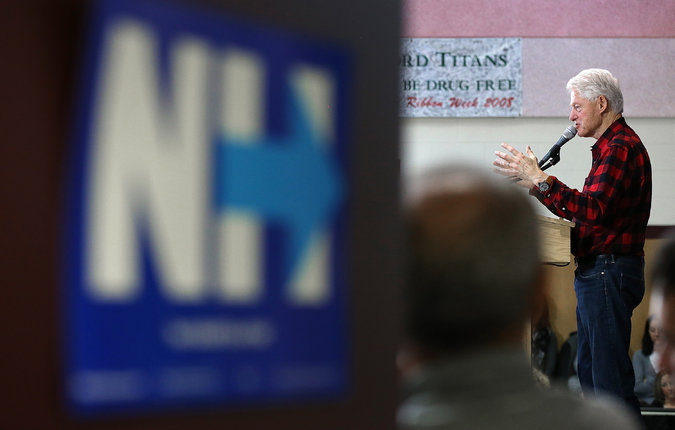
If you had a sense of deja vu to former president Bill Clinton’s weekend harangue against Vermont senator Bernie Sanders, it’s understandable. ![]()
![]()
The attack was reminiscent of Clinton’s bristling criticisms of then-senator Barack Obama in the 2008 Democratic presidential nomination contest, when Obama upset Clinton’s wife Hillary Clinton, who is running again for the nomination against Sanders, a septuagenarian democratic socialist. Sanders essentially tied Clinton in last week’s Iowa caucuses and is projected to win tomorrow’s New Hampshire primary.
But Clinton’s remarks are also eerily reminiscent of the attacks that former British prime minister Tony Blair mounted against the insurgent candidate of the hard left, Jeremy Corbyn, when it looked like Corbyn, another elderly socialist, might win the Labour Party’s leadership last summer.
In mid-August, Blair pleaded with the party that he once led for 13 years, arguing that Corbyn’s election would lead to Labour’s annihilation, begging voters not to use Corbyn as a vehicle to chastise Blair’s ‘New Labour’ rebranding. Two weeks later, Blair struck out again, bitterly dismissing Corbynmania as ‘Alice in Wonderland’ stuff.
Of course, Corbyn did win the leadership, with virtually no support among Labour’s Westminster establishment, and he did so in large part because he positioned himself as the anti-Blair — opposed to the Iraq war, opposed to the ‘third way’ compromise of ‘New Labour’ that chiefly accepted the Thatcherite approach to government and economic policy. Corbyn himself ignored Blair and the other high priests of the New Labour era while he argued for a Labour Party more responsive to people and a more leftist brand of politics that British voters haven’t seen from a major party leader since the 1960s. By staying above the fray, Corbyn only showed how un-Blair-like he could be. And it worked.
It’s hard to overstate just how reviled Blair has become in the United Kingdom these days, not only because Iraq, but for the unseemly way that he’s pursued wealth after leaving 10 Downing Street in 2007.
Clinton himself doesn’t have to defend the Iraq war (though his wife’s vote in the US Senate in 2002 likely derailed her 2008 presidential hopes). Former US presidents (and secretaries of state), meanwhile, have been enriching themselves for years with well-paid speeches. But when Sanders critiques the connection between Wall Street and politics, it’s a direct shot against both Clintons, including Bill, who enacted welfare reform with Newt Gingrich’s support, deregulated derivatives, loosened banking regulations and welcomed Robert Rubin, a former Goldman Sachs executive, as US treasury secretary. Sanders is also critiquing the unseemly appearance of donors, both domestic and foreign, lining up to give money to the Clinton Foundation even when Hillary Clinton was serving as America’s top diplomat.
Like Corbyn, Sanders has brushed off the criticism, even as some polls show him now tied nationally against Clinton in the polls.
Though Blair’s fulminations against Corbyn failed, he at least realized that Corbyn’s rise was a searing indictment of New Labour. As recently as last week’s debate, Hillary Clinton still claimed (comically) that she wasn’t the establishment. Bill Clinton has no such illusions. The former president spent an hour attacking Sanders in a junior high school in Milford, N.H., and he knows that a Sanders triumph in 2016, even more than an Obama triumph in 2008, is a repudiation of the Clintonian approach that’s held sway among Democrats for over two decades.